
Jeff Minter is an English video game designer and programmer who often goes by the name Yak. He is the founder of software house Llamasoft and has created dozens of games during his career, which began in 1981 with games for the ZX80. Minter's games are shoot 'em ups which contain titular or in-game references demonstrating his fondness of ruminants. Many of his programs also feature something of a psychedelic element, as in some of the earliest "light synthesizer" programs including Trip-a-Tron.

Zool 2 is a side-scrolling platform video game originally developed by The Warp Factory and published by Gremlin Graphics for the Amiga in November 1993. It is the sequel to the original Zool, which was released earlier in 1992 on various platforms.

Paperboy is an arcade action game developed and published by Atari Games, and released in 1985. The player takes the role of a paperboy who delivers a fictional newspaper called The Daily Sun along a street on his bicycle. The arcade version of the game featured bike handlebars as the controller.

Primal Rage is a fighting game developed and released by Atari Games to arcades in 1994. The game takes place on a post-apocalyptic version of Earth called "Urth". Players control one of seven large beasts that battle each other to determine the planet's fate. Matches feature many of the conventions of fighting games from the era, including special moves and gory finishing maneuvers. Ports were released for home consoles and personal computers. Efforts to perfectly emulate the arcade original have been unsuccessful due to the use of an unusual copy protection method. Toys, comics, a novel and other merchandise tie-ins were produced. More than 1.5 million copies of the game were sold.
Artworx was a Naples, Florida software company that produced and supported a line of computer games from 1981 to 2020. It is named after the founder's given name. At first the company published a variety of games, including titles in adventure and arcade-action genres, but were later best known for a strip poker series.
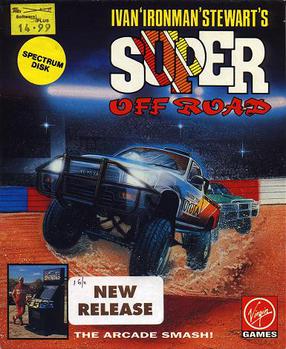
Ivan "Ironman" Stewart's Super Off Road is an arcade video game released in 1989 by Leland Corporation. The game was designed and managed by John Morgan who was also lead programmer, and endorsed by professional off-road racer Ivan Stewart. Virgin Games produced several home versions in 1990. In 1991, a home console version for the Nintendo Entertainment System was later released by Leland's Tradewest subsidiary, followed by versions for most major home formats including the Master System, Genesis, Super NES, Amiga, and MS-DOS. A port for the Atari Jaguar was announced but never released. Some of the ports removed Ivan Stewart's name from the title due to licensing issues and are known simply as Super Off Road.

Xenon 2: Megablast is a 1989 shoot 'em up video game developed by The Bitmap Brothers and published by Image Works for the Amiga and Atari ST. It was later converted to the Master System, PC-98, X68000, Mega Drive, Commodore CDTV, Game Boy, Acorn Archimedes and Atari Jaguar platforms. The game is a sequel to Xenon and takes place a millennium after the previous title. The goal of the game is to destroy a series of bombs planted throughout history by the Xenites, the vengeful antagonists of the first game.

Carrier Command is a 1988 video game published by Rainbird for the Amiga, Atari ST, IBM PC compatibles, ZX Spectrum, Macintosh, Commodore 64, and Amstrad CPC. Carrier Command is a cross between a vehicle simulation game and a real-time strategy game where players control a robotic aircraft carrier.
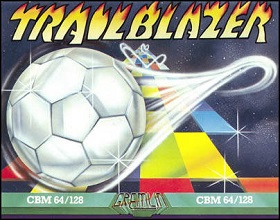
Trailblazer is a racing video game developed by Mr. Chip Software and published by Gremlin Graphics for the ZX Spectrum, Commodore 64, Atari 8-bit family, Amstrad CPC and Commodore 16/Plus/4 in 1986. It was ported to the Amiga and Atari ST.

Bomb Jack is a platform game published by Tehkan for arcades in and later ported to home systems. The game was a commercial success for arcades and home computers. It was followed by several sequels: the console and computer game Mighty Bomb Jack, the arcade game Bomb Jack Twin, and Bomb Jack II which was licensed for home computers only.

Double Dragon is a 1987 beat 'em up video game developed by Technōs Japan and distributed by Taito for arcades across Asia, North America and Europe. It is the first title in the Double Dragon franchise. The game's development was led by Yoshihisa Kishimoto, and it is a spiritual and technological successor to Technos' earlier beat 'em up, Nekketsu Kōha Kunio-kun (1986), released outside of Japan by Taito as Renegade; Kishimoto originally envisioned it as a direct sequel and part of the Kunio-kun series, before making it a new game with a different cast and setting.
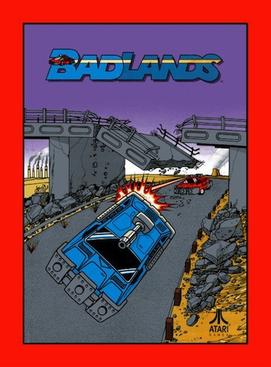
Badlands is a 1989 arcade video game published by Atari Games. It was ported by Domark under the Tengen label to the Amiga, Amstrad CPC, Atari ST, Commodore 64, and ZX Spectrum. The game is a re-themed version of Atari's previous racing games Super Sprint and Championship Sprint with the addition of vehicular combat. Badlands is set in the aftermath of a nuclear war and races around abandoned wastelands with many hazards. Three gun-equipped cars race around a track to win prizes.
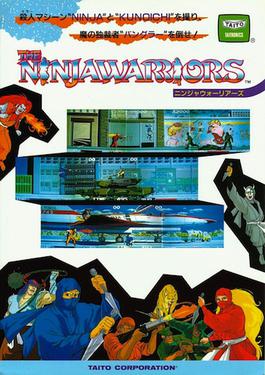
The Ninja Warriors (ニンジャウォーリアーズ) is a side-scrolling beat 'em up video game developed and released by Taito in 1987. The original arcade game situated one display in between projected images of two other displays, creating the appearance of a triple-wide screen. Ports were released for home systems including the Amiga, Atari ST, ZX Spectrum, Commodore 64, Amstrad CPC, PC Engine, and Sega Mega-CD.
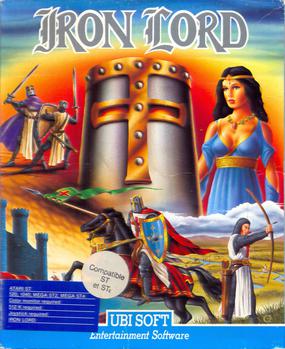
Iron Lord is an adventure video game developed by Orou Mama and Ivan Jacot for the Atari ST and published by Ubi Soft in 1989. It was ported to the Amiga, Acorn Archimedes, Amstrad CPC, Commodore 64, ZX Spectrum, and DOS.

Escape from Singe's Castle, also known as Dragon's Lair Part II - Escape From Singe's Castle, is a computer game for the Amstrad CPC, Commodore 64 and ZX Spectrum home computers, released by Software Projects in 1987.

RoboCop is a beat 'em up / run and gun video game developed and published by Data East for arcades in 1988 based on the 1987 film of the same name. It was sub-licensed to Data East by Ocean Software, who obtained the rights from Orion Pictures at the script stage. Data East and Ocean Software subsequently adapted the arcade game for home computers.

Falcon is a combat flight simulator video game and the first official entry in the Falcon series of the F-16 jet fighter's simulators by Spectrum HoloByte. Originally developed by Sphere for Macintosh and MS-DOS in 1987 and ported to several platforms between 1988 and 1992, the game earned commercial success and critical acclaim.
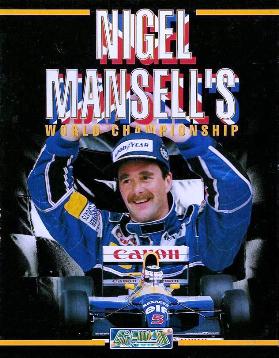
Nigel Mansell's World Championship Racing is an arcade-style Formula One racing video game developed by Gremlin Graphics and released for various systems. The game was largely successful on Amiga and DOS platforms, and was consequently ported to home consoles.
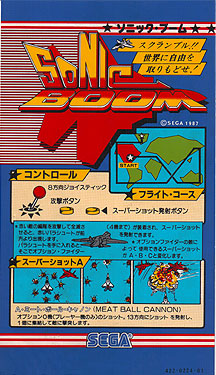
Sonic Boom is a vertical scrolling shooter developed by Sega and released in the arcades in 1987. Home computer versions for the Amiga, Atari ST, Amstrad CPC, Commodore 64 and ZX Spectrum were released in 1990 by Activision. The original arcade version was released on the Sega Astro City Mini console in 2021.

Manchester United Europe, developed by Krisalis Software, is the follow-up to the 1990 video game Manchester United which had sold over 100,000 copies. The Atari Lynx port was released under the title of European Soccer Challenge.



















